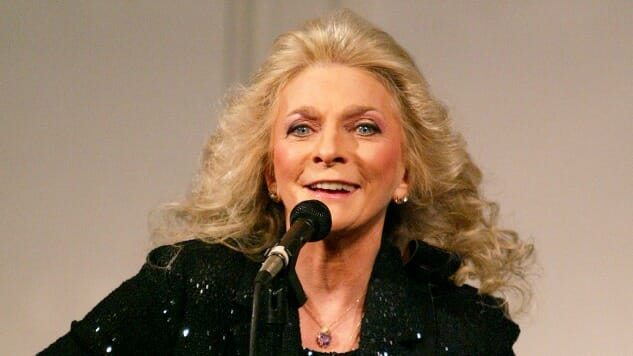Judy Collins on Leonard Cohen, Hillary Clinton and More
Photo by Vince Bucci for Getty Images
The results of the 2016 Presidential election cannot be sitting well with Judy Collins this week. The folk legend, writer, social activist and public speaker has been an openly progressive force dating back to her first record in 1961, A Maid of Constant Sorrow, which featured a cover of the venerable title track (changed from “Man of Constant Sorrow”), plus more traditional cuts like “Wild Mountain Thyme” and “Pretty Saro.”
Throughout the rest of her (at times tumultuous) career, Collins would record her own renditions of vital protest songs such as Dylan’s “Mr. Tambourine Man,” Pete Seeger’s “Turn, Turn, Turn” and “Where Have All the Flowers Gone?” and Joni Mitchell’s “Both Sides, Now,” which peaked at No. 8 on the Billboard Hot 100. The 77-year-old Seattle native’s catalogue not only helped soundtrack such era-specific issues as the unpopular Vietnam War and the Civil Rights Movement, but through her music, Collins also shone a light on now-legendary songwriters like Leonard Cohen, Eric Andersen, Ian Tyson, Randy Newman and Robin Williamson, among others.
Today, Collins still performs and releases new material (her latest was this year’s joint effort with singer/songwriter Ari Hest, Silver Skies Blue). She also maintains an active presence on social media, often posting about politics, and before the election, her favored Presidential candidate. Prior to Election Day, she wrote on Facebook: “Let’s do it—get this experienced, steady, thinking, working, motivating, smart, connected and respected (around the world) candidate into office. Stop fooling around with a land mine that could go off in your hands and in the White House—do the right thing for your country and your [sic] chidren. Yes!! Vote for Hillary—Celebrate diversity and the American Dream.”
Paste caught up with Collins earlier this month (just prior to Cohen’s death and Election Day, unfortunately) to look back at her storied career, talk about her friendship with Cohen and her feelings surrounding Hillary Clinton, whom she calls “remarkable.”
Paste: You started out as more of a classical musician, then you changed course to become more involved in the folk-music revival in the ‘60s. What triggered that change?
Judy Collins: I did study seriously and I played with the symphony and studied with a great woman conductor who was also a great pianist. So I got really a incredible training when I was growing up, being able to listen to and study the classics and then also have all the music that my father did, which was popular music at the time, you know the Rodgers and Hart songs and the Great American Songbook. Of course in high school I did all kinds of things, and in junior high I sang in church and school choirs and performed in the Broadway shows we did in school.
When I was 15, I found a couple of folk songs on the radio and was just completely dumbstruck by them and I decided I must get a guitar and I started hanging out with the Denver Folklore Society and buying all the records and listening to Bob Gibson, Josh Wyatt, Jean Ritchie and all these wonderful artists and of course Pete Seeger. I quickly decided that [folk] was what I was going to do instead of being a classical pianist.
Paste: The movement had a lot of left-wing ideology behind it. Was there something about that that spoke to you even as a young person then?
Collins: Oh, yes. I was raised in a very proactive, radical kind of family—outspoken, always on the edge of things. My father was in radio but he talked about everything that was controversial. And he was controversial, so I was up for that, too. It was the age in which the war was going on, and we were opposed to the war and we were very much in favor of getting rid of racial segregation. It was all a part of the package. You had to be out there on the barriers of trying to change people’s minds, and I think we did change people’s minds. Both with the music and our activism. So it fit right into my own personality.
Paste: What gives you new ideas and inspiration for projects to pursue?
Collins: Well, I’m open to new ideas. I’m a great reader—that’s my main addiction. I also always wanted to write and have written a number of books now in my life. My first effort was a songbook in 1969 and actually, it was Stephen Stills who suggested to me that I should write instead of just putting out a songbook, that I write chapters. He knew about my family and knew they were interesting, fascinating, different and odd. And amazing! Not a run-of-the-mill family. He suggested I write seven chapters about my family, which I did.
-

-

-

-

-

-

-

-

-

-

-

-

-

-

-

-

-

-

-

-

-

-

-

-

-

-

-

-

-

-

-

-

-

-

-

-

-

-

-

-








































